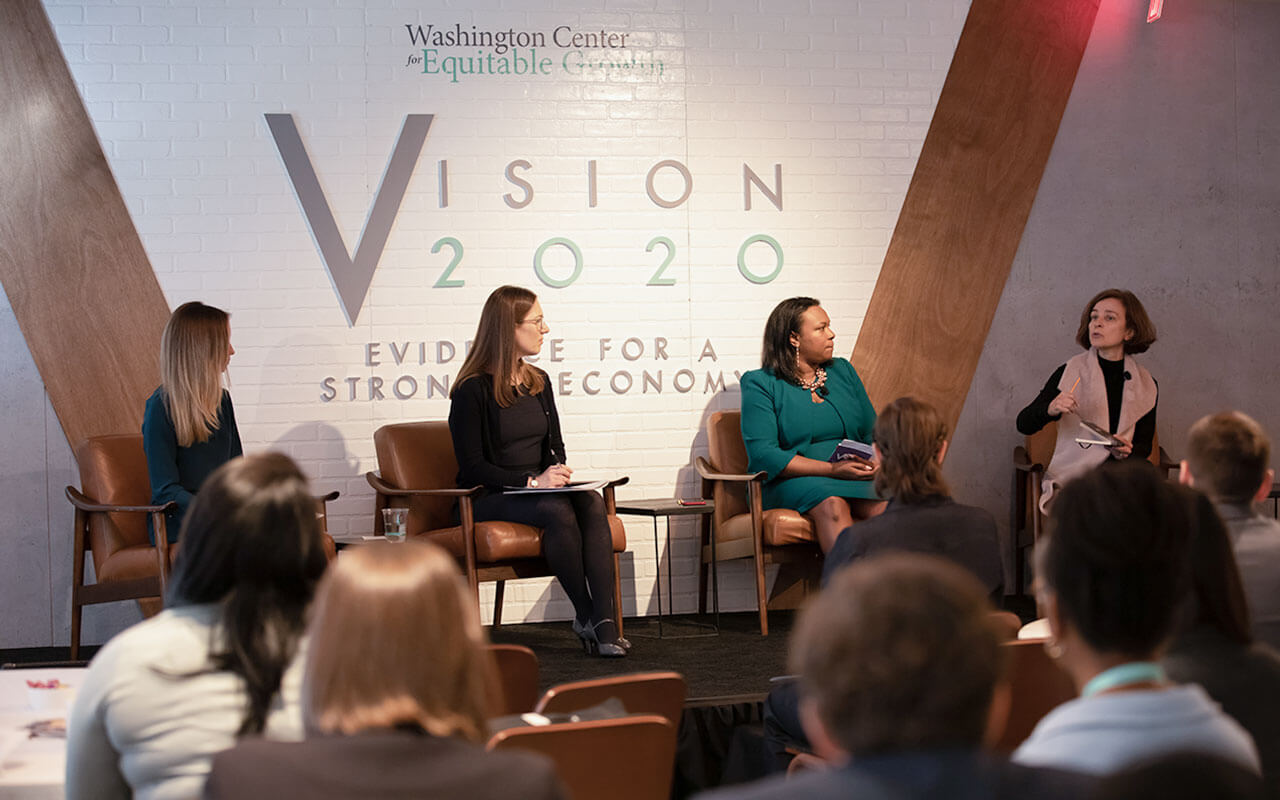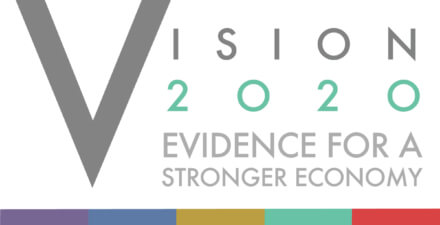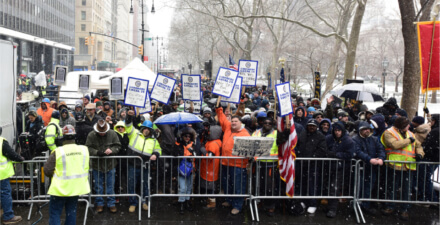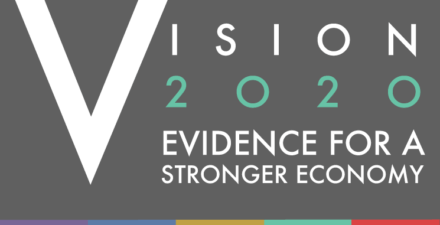Vision 2020 conference probes inequality’s effects on the U.S. economy and policy changes to counteract them

A spirit of optimism about the ability of government to address fundamental issues underlying U.S. economic inequality and a determination to advance evidence-based policies for broad-based economic growth infused an all-day policy event hosted by the Washington Center for Equitable Growth on November 1.
At “Vision 2020: Evidence for a Stronger Economy,” which was designed to help inform economic policy ideas in advance of the 2020 elections, speakers and participants engaged in thoughtful discussion on a number of key topics. Those topics included the effects of the decline of union power, structural racism in the economy, the rise of monopsony power in the labor market, and more.
The speakers at the conference made clear that the depth of structural problems, such as racial and gender income and wealth gaps, the decline of worker power, and economic concentration, make dramatic changes in policy essential, yet they also acknowledged the difficult political, economic, and societal barriers to achieving real change. There are no simple solutions, and inequality has caused the economic and political decks to be stacked against systemic reform.
Attendees heard several major threads woven through the day of panels, speeches, and conversations (to watch video from the day’s session, click here, and for photos, click here).
The first major theme was that the change needed to achieve broad-based economic growth and significantly diminished inequality is not possible without the legislative and regulatory tools of the federal government. This point was made by several speakers. Carmen Rojas, formerly of The Workers Lab, related that her former organization’s efforts to empower workers were initially aimed at getting the private sector to act, but the organization found that “government is actually key to scaling anything that would benefit working people.” She noted that this “should have been obvious, given the history of the labor movement in this country, and unfortunately, it wasn’t.”
Federal Trade Commissioner Rohit Chopra emphasized the power of the federal government needed to be brought to bear on corporate concentration. The FTC, he said, “should be about confronting massive concentrations of power in our economy, ending conflicts of interest in some of the biggest businesses in our society, going after the practices that diminish workers’ wages and independence, and fundamentally, making sure that the economy is competitive and delivers benefits for everyone who wants to work hard.”
And Harvard University’s Lizabeth Cohen, discussing the political challenges facing supporters of the Green New Deal, pointed to the New Deal implemented by President Franklin Delano Roosevelt in response to the Great Depression, as the “gold standard” for the federal government taking responsibility in a national emergency.
The second major theme of the day was that inequality in the United States has led to the concentration of economic power at the top of the income distribution, which has led to a comparable aggregation of political power. That confluence of power has turned policy in favor of elites and stands in the way of change.
Equitable Growth President and CEO Heather Boushey said that inequality gave those at the top not only economic power but also political power. As inequality has risen, she said, “it’s not just the buying of a particular piece of legislation, but how that concentration of economic resources gives people that political and social power to set the agenda, to decide what it is that we’re going to talk about, what it is that’s important to us.” She added, “How can you have democratically accountable institutions when you have so much concentration of wealth in the hands of individuals and across markets?”
On this topic, Alexander Hertel-Fernandez of Columbia University also invoked FDR, who, he said, “understood that public policy is a tool for building both economic and political power.” Explaining one of the reasons wages have lagged and unions have declined, Hertel-Fernandez pointed to the post-World War II era when he said, “employers realized that they could use public policy to entrench their economic positions and … since the New Deal … the story of declining worker power is not just one of automatic changes in the economy. Employers have worked in new domains and invested in old domains to change policies in ways that disadvantage workers.”
As Tom Perriello of the Open Society Foundations put it:
I think we need to understand the interrelationships of economic [and] corporate power with democratic power and with racial power. And we see right now an unbelievable concentration of wealth, but that concentration of wealth is able to translate itself into political power that affects the ability to produce results for the very parties or organizations that want to build power by standing up for working-class people, middle-class folks of all races.
He added that there “are very few examples through human history, including American history, of multiracial democracy existing with genuine equality of voice.” He argued that “to sustain that kind of multi-identity democracy is difficult in part because of how those with power can divide in order to prevent the building of power.”
Citing a specific example, Karen Dynan of Harvard University discussed the student debt burden facing millennials, especially people of color, and noted that the problem is not with the federal student loan program in general. College is a worthwhile investment for most students, she said, particularly those from low-income families. But weak regulation, she noted, fails to hold colleges—in particular, private for-profit colleges—accountable for luring students into taking on significant debt and then too often failing to deliver value in the form of college degrees. In the same session, Claudia Sahm, formerly with the Federal Reserve and now the director of macroeconomic policy at Equitable Growth, noted that the victims of for-profit colleges were disproportionately the first in their families to attend college. Both Dynan and Sahm made clear that the for-profit college industry has used its political power to weaken regulation.
The third theme, a loss of trust, probed the diminution of Americans’ confidence in institutions—in politics and government, in business, and in the media—resulting from economic anxieties and the concentration of power.
In describing the different political landscapes faced by President Franklin D. Roosevelt and today’s supporters of the Green New Deal, Harvard’s Cohen pointed to the difference in the level of trust among the American people. “The New Deal of the 1930s was most remarkable for how it inspired a generation of Americans to trust the federal government as capable of solving many of the nation’s and their personal problems,” she said. “That confidence would persist during at least three more post-war decades. Today, however, we are in a very different place. Trust in the federal government has eroded.”
Boushey said that inequality subverts trust in institutions, and the people most in need of political and economic change mistrust the ability of government, political parties, and other organizations to support them and their families. It makes the public less willing to pay taxes, she said, because there is less confidence that resources will be spent in ways that make their lives better.
Duke University’s Sarah Bloom Raskin, describing how an increasing number of Americans have lost their economic resilience, or the financial ability to withstand economic shocks, noted that people become alienated from the political system as they lose confidence that it can produce change for them. “As income levels get a match on the political side, we lose a political and a regulatory responsiveness that actually could be doing something to address these questions of resilience,” she said. “People then lose confidence in [actual] solutions to do anything for them.”
Finally, the President of the Services Employees International Union Mary Kay Henry said that this weakening of trust in institutions was affecting the efforts of unions to gain the support of workers.
The fourth theme was that economic anxieties felt by much of the U.S. population are due, in considerable part, to the decline of worker power—the ability, mainly through labor unions, to stand up for higher wages from employers.
In a conversation about the rise of monopsony—when firms, rather than labor markets, set wages—Arindrajit Dube of the University of Massachusetts Amherst said that the most significant trends limiting wages over the past several decades have been the loosening of certain constraints on employers, such as fairness norms, labor unions, and more meaningful minimum wages. Hertel-Fernandez emphasized the inadequacy of the law and of the judiciary to address the “malign neglect” of labor law by employers. He cited the potential revamping of labor laws as an opportunity to find out what workers want in labor organizations. Likewise, Cecilia Muñoz of New America focused on how the nature of work is changing and stressed the need to engage workers in the conversation about how best to empower them to affect work’s future direction. Rojas cited the need to build new models of worker power, using 21st century technology. And the FTC’s Chopra said that he hopes the FTC will bring an antitrust case that focuses on labor market competition, noting that the agency has been too weak with respect to enforcement in this area.
But perhaps the most powerful evocation of how workers are faring in today’s economy was a story told by the SEIU’s Henry, who made the case for workers to be able to organize in entire sectors to combat the increasing concentration in many industries. She told the audience about a hospital worker named Nyla Payton, an employee at the University of Pittsburgh Medical Center. Hospital mergers have given UPMC something close to monopsony power over the labor market for hospital workers in the Pittsburgh region, she said. Henry spoke in detail about how the institution has abused that power to impose egregious working conditions on its workers and prevent them from forming a union.
The fifth theme of the day was the experience of individuals and families in the U.S. economy as fundamentally different based upon race, ethnicity, and gender.
The economic and political disparities faced by people of color and by women (and especially by women of color) were a major theme throughout the day. Dania Francis of the University of Massachusetts Boston pointed to the impact of the gaping racial wealth gap on human capital investment. She noted that wealth, in addition to being a source to draw on for such investment, is protective (providing shelter from life’s unexpected setbacks), affords opportunities (to be an entrepreneur, to take risks), and perpetuates itself (is intergenerational). “Who are we losing?” she asked.
Similarly, Camille Busette of The Brookings Institution said that the asset creation process “is very racialized.” She pointed to government policies such as redlining, the exclusion of blacks from certain kinds of jobs, and other structural issues built upon existing disparities to contribute greatly to the racial wealth gap. Even for African Americans who owned homes before the 2007 financial crisis, a disproportionate amount of those were bought using subprime loans, so they were set up to fail, and those assets disappeared. “The reason that we have a racial wealth gap,” she said, “is that we have racism.”
In the same session, Opportunity at Work’s Byron Auguste discussed the skills gap, pointing out that if employers wanted more workers in a particular field, then they could raise compensation for those jobs. He also said that the conversation about the skills gap misses a key point. “We’re thinking about the skills gap backwards,” he argued. “The skills gap is the consequence of an opportunity gap … it’s not the cause.” He said that artificial credentials requirements for certain jobs, such as a bachelor’s degree for office administrative assistants, tended to exclude black workers.
Bucknell University’s Nina Banks told the story of Sadie Alexander, who, in 1921, became the first African American woman to receive a Ph.D. in economics in the United States (at the University of Pennsylvania). Since nobody would hire her, she went on to earn a law degree at UPenn as well and became one of the leading civil rights voices challenging the legacy of slavery. She did so from the point of view of an economist. Concerned about the status of African American workers—who were frequently the last hired and therefore first fired—she focused on the need for full employment policies and was possibly the first economist to advocate a federal jobs guarantee, a policy idea that is enjoying renewed attention in the current economic and political debate.
And finally, the last theme of the day was elicited by the session moderators, as well as through audience questions, which asked for evidence-based policy recommendations from the panelists and speakers. Among them were the following:
- Bradley Hardy of American University pointed to the need to direct considerably greater public resources into education, safety net programs, skills training, and other programs critical to building human capital.
- Monica Garcia-Perez of St. Cloud State University urged policymakers not to focus only on the job market. She said it was a symptom, not the fundamental problem. She called for wellness benefits such as health insurance and retirement to be separated from jobs, so that individuals and families could receive them regardless of whether they are employed.
- Maya Rockeymoore Cummings of Global Policy Solutions said the policy changes that were most needed were programs that support families along the continuum of life, such as paid family leave, universal childcare, and long-term care, and while expressing strong support for Social Security, pointed to the need to strengthen other retirement benefits to provide greater income to seniors.
- Francis called for a program of reparations that includes a direct transfer of resources in order to help African Americans reduce the wealth gap created by the legacy of slavery, Jim Crow laws, and other state-sanctioned discrimination.
- Henry, in addition to supporting sectoral collective bargaining, which is the norm in many European countries, called for “a new American social wage” that includes benefits such as healthcare, childcare, parental leave, vacation, and pension support. Similarly, Dube called for sectoral wage standards and for wage boards to enforce them.
- Auguste noted the need for greater income support for those learning new skills to improve their status in the job market, and for student loan forgiveness in unusual circumstances such as the financial crisis.
- Busette called for the elimination of the juvenile justice system, which she said has a deeply negative, lifelong impact on countless African American boys.
- Dynan and Sahm stressed the need for policies to inject money into the U.S. economy when a recession is beginning by providing benefits to low- and middle-income Americans, who are most likely to spend those resources. Sahm pointed to the proposals contained in Recession Ready, a book of ideas compiled by Equitable Growth and the Hamilton Project.
These and other policy ideas will be compiled into a collection of 20 innovative, evidence-based, and concrete ideas to shape the 2020 policy debate, which Equitable Growth’s Director of External and Government Relations David Mitchell announced will be published in January by Equitable Growth. Several of the speakers at “Vision 2020” are among the academics who are contributing essays.






